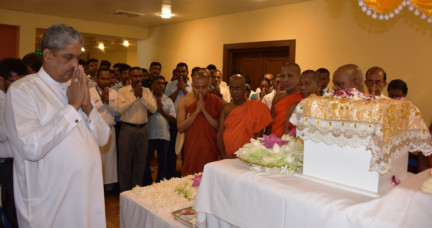
Pakistan: After three weeks of exhibition at various locations in Sri Lanka, where millions of devotees flocked to pay their respects, relics of Buddha have returned to Pakistan.
The relics were sent by the government of Pakistan, following a special request from Sri Lanka, as part of the annual Buddha Rashmi National Vesak Festival.
Senior government officials — including Sri Lanka’s Field Marshal Sarath Fonseka, Minister of Sustainable Development, Wildlife and Regional Development — and diplomats from Pakistan’s High Commission were present at the Bandaranaike International Airport to see off the relics.
The exposition of the relics was inaugurated on April 29, 2018 by Sri Lankan President Maithripala Sirisena and Prime Minister Chandra Wickramasinghe, amid a large gathering of Buddhist priests, scholars, ministers, parliamentarians and high level government functionaries at Temple Trees.
As part of the exposition, the relics were exhibited in different temples at Colombo, Wellampitiya, Kalutara, Galle, Matara, Kurunegalla, Anuradhapura and Kandy where hundreds of thousands of devotees visited daily and performed rituals.
The relics were excavated from Taxila — one of the most important archaeological sites in Asia — located in the Rawalpindi district of Pakistan’s Punjab province.
They were originally discovered near the Dharmarajika stupa, the earliest and one of the eight largest Buddhist stupas in South Asia, built in the 3rd century BC in order to house the relics of the Buddha by the famous Mauryan King Asoka who was also known as Dharmaraja for his services to Buddhism.
Dharmarajika stupa was excavated by Ghulam Qadir in 1912-16 under the instructions of Sir John Marshall and A.D. Siddiqui in 1934-36.
The ancient land of Pakistan was once the centre of Buddhist civilisation that took root under the Mauryan king Ashoka 2,300 years ago and later reached out to the world through missionaries.
Experts suggest that Pakistan has tremendous potential for becoming centre of attraction for Buddhists as many Buddhist artefacts and ancient sites are based in the ancient Ghandhara region comprising Taxila, Mardan, Swat and areas in Hazara division.












